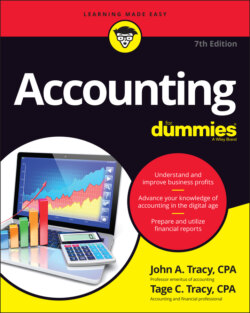Читать книгу Accounting For Dummies - John A. Tracy - Страница 73
INTERNAL CONTROLS AGAINST MISTAKES AND THEFT
ОглавлениеAccounting is characterized by lots of documentation — forms and procedures (digital or hard copy) are plentiful. Most business managers and employees have their enthusiasm under control when it comes to the documentation and procedures that the accounting department requires. One reason for this attitude, in our experience, is that nonaccountants fail to appreciate the need for accounting controls.
These internal controls are designed to minimize errors in bookkeeping that processes a great deal of detailed information and data. Equally important, controls are necessary to deter employee fraud, embezzlement, and theft as well as fraud and dishonest behavior against the business from the outside. Every business is a target for fraud and theft, such as customers who shoplift; suppliers who deliberately ship less than the quantities invoiced to a business and hope that the business won’t notice the difference (called short-counts); and even dishonest managers themselves, who may pad expense accounts or take kickbacks from suppliers or customers.
For these reasons, a business should take steps to avoid being an easy target for dishonest behavior by its employees, customers, and suppliers. Every business should institute and enforce certain control measures, many of which are integrated into the accounting process. Following are five common examples of internal control procedures:
Requiring a second signature or electronic approval on cash disbursements over a certain dollar amount
Matching up receiving reports based on actual counts and inspections of incoming shipments with purchase orders before approving checks for payment to suppliers
Requiring both a sales manager’s and another high-level manager’s approval for write-offs of customers’ overdue receivable balances (that is, closing the accounts on the assumption that they won’t be collected), including a checklist of collection efforts that were undertaken
Having auditors or employees who do not work in the warehouse take surprise counts of products stored in the company’s warehouse and compare the counts with inventory records
Requiring mandatory vacations by every employee, particularly bookkeepers and accountants, during which time someone else does that person’s job (because a second person may notice irregularities or deviations from company policies)
I (coauthor Tage) have decades of experience working closely with small businesses, and I’ve found that many small-business owners tend to think they’re immune to embezzlement and fraud by their loyal and trusted employees. These are personal friends, after all. Yet many small businesses are hit hard by fraud and can least afford the consequences. Most studies of fraud in small businesses have found that the average loss is well into six figures! You know, even in a friendly game of poker with our buddies, we always cut the deck before dealing the cards around the table. Your business, too, should put checks and balances in place to discourage dishonest practices and to uncover any fraud and theft as soon as possible.
And then there’s the growing specter of hacks into the information databases of businesses. These intrusions are referred to as cyber threats, hacks, and ransomware. Hackers have broken into the computer information systems of many major companies, getting around the inadequate controls the businesses had in place. Interestingly, hackers haven’t shown interest in accounting information per se. Rather, the hackers are after Social Security numbers, credit scores, home addresses, passwords, email addresses — mainly personal and private information. In addition, there’s been a growing trend with ransomware where the perpetrator hacks a computer system to paralyze a company from operating, thus causing significant financial damage (and demanding a ransom payment to restore order).
We don’t know of a computer database break-in for the purpose of manipulating or destroying accounting information — but a hacker could alter accounting information after breaking into a company’s information system. The topic of cybercrime is beyond the scope of this book, other than to warn you about this serious threat that requires a whole new set of internal controls. A new class of forensic professionals has emerged who advise and assist businesses in coming to grips with cyber threats. These specialists include both accountants and IT (information technology) experts.
